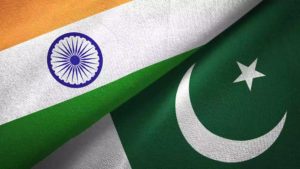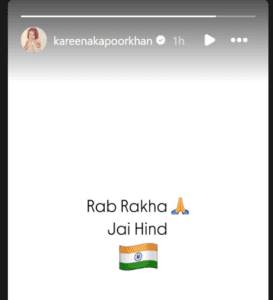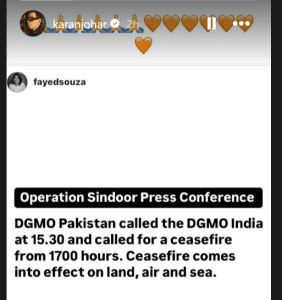On May 10, 2025, India and Pakistan agreed to a full and immediate ceasefire, halting all military actions on land, at sea, and in the air. This decision followed intense cross-border violence, particularly in Indian-administered Kashmir, and was facilitated through U.S.-mediated negotiations. The ceasefire was welcomed by various sectors, including Bollywood, where celebrities expressed their support and hopes for lasting peace.

The Ceasefire Agreement: A Diplomatic Milestone
The ceasefire agreement was announced by Foreign Secretary Vikram Misri, confirming that Pakistan had contacted the Indian Director General of Military Operations (DGMO) on the afternoon of May 10. Both sides agreed to cease all military actions starting from 5 PM IST. The announcement came after a week of escalating hostilities, including missile exchanges and drone strikes, particularly around the disputed Kashmir region .
Also Read : J.K. Rowling Responds to Paapa Essiedu’s Casting as Snape in HBO’s Harry Potter Series
Bollywood’s Unified Response
Bollywood celebrities took to social media to express their reactions to the ceasefire agreement:
- Raveena Tandon welcomed the decision, stating, “If this is true, then it’s a welcome decision. #ceasefire.” She emphasized the importance of ensuring that India does not “bleed again” due to state-sponsored terrorism. Raveena Tandon also highlighted the role of international financial institutions in monitoring where their funds are directed, suggesting that loans should not be used to fund ammunition or warfare.
- Kareena Kapoor shared her support by posting “Rab rakha” (folded hands emoji) and “Jai Hind” (Indian tricolour emoji) on Instagram, conveying her hopes for peace and unity.


- Karan Johar responded with folded hands and orange heart emojis, signaling solidarity with the ceasefire agreement.


- Ananya Panday and Varun Dhawan shared the announcement on their Instagram Stories, adding folded hands emojis in support.
- Shekhar Kapur, filmmaker, wrote on X (formerly Twitter): “Ceasefire declared today, disengagement started at 5 PM. Hopefully, all those who support terrorism against India now realize our leadership will not hold back in taking strict and appropriate action. Now India can move on to what is most needed—achieving our development goals.”
Background to the Ceasefire
The ceasefire agreement follows a series of events that escalated tensions between India and Pakistan:
- On April 22, 2025, a terrorist attack in Pahalgam, Jammu and Kashmir, resulted in the deaths of 26 civilians, including 25 Hindu tourists and one Nepali national. The attack was attributed to the Islamic Resistance Front, an offshoot of the Pakistan-based Lashkar-e-Taiba .
- In response, India launched “Operation Sindoor” on May 7, targeting terrorist infrastructure in Pakistan. The operation involved missile strikes on nine locations, including Bahawalpur and Muridke, which are believed to be hubs of terrorist organizations Jaish-e-Mohammed and Lashkar-e-Taiba .
- Pakistan retaliated with missile launches and drone strikes, leading to significant casualties on both sides. The conflict raised concerns about the potential for a broader war between the two nuclear-armed neighbors .
The ceasefire provides an opportunity for both nations to de-escalate tensions and focus on diplomatic solutions. However, its durability remains uncertain, as sporadic violence and shelling have been reported even after the agreement .
The Role of International Mediation
The United States played a pivotal role in mediating the ceasefire agreement. U.S. Secretary of State Marco Rubio and Vice President JD Vance, along with former President Donald Trump, facilitated the negotiations between India and Pakistan. Their involvement underscores the importance of international diplomacy in resolving conflicts between neighboring nations .
Public Sentiment and Hopes for Peace
The public response to the ceasefire has been mixed. While celebrations were reported in areas like Kashmir, where residents expressed relief and hope for peace, skepticism remains due to past failed ceasefires. Local residents have voiced concerns about the potential for renewed violence, citing previous instances where ceasefire agreements were short-lived .
The India-Pakistan ceasefire agreement marks a significant step toward peace between the two nations. Bollywood’s unified response reflects the collective desire for harmony and stability. As both countries navigate the complexities of this agreement, the international community continues to encourage dialogue and cooperation to ensure a lasting resolution to the conflict.

